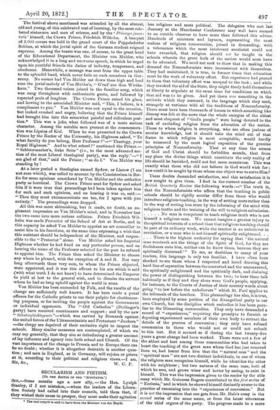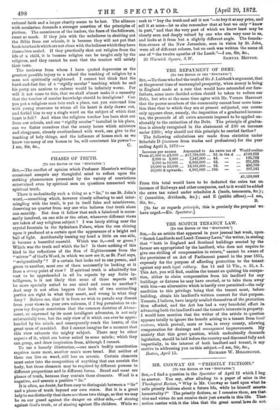SECULARISM AND PIETISM.
(To THE FMITOR OF THE " SPEOTITOR.1
&n,—Some months ago a new ally, — the Hon. Lyulph Stanley, if I not mistaken,—whom the leaders of the Libera- tion Society had called into their councils, told them that, if they wished their cause to prosper, they must make their agitation
• The real culprit is said to have been the Minister von der Heydt.
less religious and more political. The delegates who met last January at the Manchester Conference may well have seemed to an outside observer to have more than followed this advice. Hundreds of ministers and laymen, representing the most zealous of religious communities, joined in demanding, with a vehemence which the most intolerant secularist could not have exceeded, that religion should not be taught in the schools wherein the great bulk of the nation would soon have to be educated. We need not seek to show that in making this demand the Nonconformists were inconsistent with themselves. They had maintained, it is true, in former times that education must be the work of voluntary effort. But experience had proved to them that voluntary effort was unequal to the task ; and while they invoked the aid of the State, they might freely hold themselves at liberty to stipulate at the same time for conditions on which that aid was to be given. And yet there was something in the attitude which they assumed, in the language which they used, strangely at variance with all the traditions of Nonconformity. There must have been thousands of homes in which something like dismay was felt at the news that the whole energies of the ablest and most eloquent of " God's people " were being devoted to the task of excluding religion from the education of the nation. Those to whom religion is everything, who are often jealous of secular knowledge, lest it should take the mind out of that frame in which religion is most acceptable, would hardly be reassured by the most logical exposition of the genuine principles of Nonconformity. That at any time the names of God and Christ should be forbidden sounds, that from any place the divine things which constitute the only reality of life should be banished, could not but seem monstrous. This was exactly what those who did not believe in God would wish for ; how could it be sought by those whose one object was to serve Him?
These doubts demanded satisfaction, and this satisfaction it is now sought to give them. I find in the current number of the British Quarterly Review the following words :—" The truth is, that the Nonconformists who affirm that the teaching in public schools should be rigidly secular differ from those who would introduce religious teaching, in the way of setting more rather than in the way of setting less store by the informing of the mind with religious truths and the training of the will to religious submission.
rational faith and a larger charity seems to be lost. The alliance with secularism demands a stronger assertion of the principles of pietism. The consciences of the leaders, the fears of the followers, exact so much. If they join with the unbeliever in abutting out the Bible from our schools, it is because they will not put that book into hands which are not clean with the holiness which they have themselves sealed. If they practically shut out religion from the life of a child, it is because religion can be taught only by the religious, and they cannot be sure that the teacher will satisfy their tests.
The reviewer from whom I have quoted deprecates as the greatest possible injury to a school the teaching of religion by a man not spiritually enlightened. I cannot but think that the hard-and-fast line of a "rigidly secular" teaching which he and his party are anxious to enforce would be infinitely worse. For will it not come to this, that we shall almost make it a necessity that the teacher of secular knowledge should be irreligious? Can you put a religious man into such a place, can you surround him with young creatures to whom all his heart is daily drawn out, and forbid him to say a single word on the subject of which that heart is full ? And when the religions teacher has been shut out from our schools, and one " rigidly secular" installed in his place, can we flatter ourselves that the scanty hours which ministers and clergymen, already overburdened with work, can give to the teaching of holy things, and the influence of homes such as we know too many of our homes to be, will counteract his power 7-



































 Previous page
Previous page